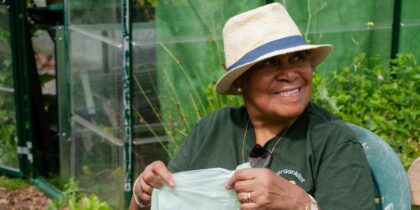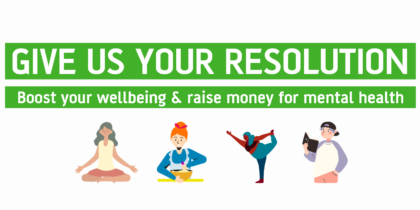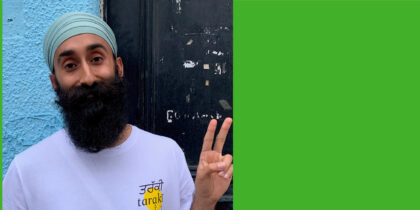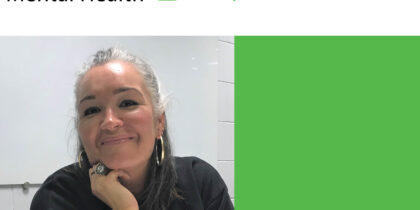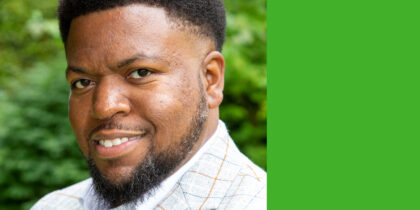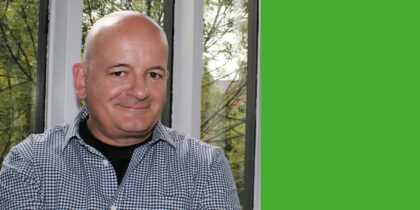Sarah Hughes, the Centre’s chief executive, joins Thea to look back at 2021 and the impact our work has been having through these extremely challenging times. From supporting the NHS to get vaccines to people with severe mental illness, to advising the Government on the mental health impact of the pandemic, to sharing people’s own stories of Covid, we’ve been continuing the fight for equality in mental health across our work.
Listen to the episode on Spotify or iTunes. The full transcript is available below.
Show notes:
- Covid resources and our list of helplines
- Our impact during 2021
- Our Covid-19 forecasting work
- A Year in Our Lives
- Understanding mental health inequalities during Covid-19
- Give us your resolution – our New Year fundraising campaign
- Equally Well UK and a resource on getting vaccinated for people living with a severe mental illness
- ‘Better together’ briefing on mentally healthier integrated care systems
Music by scottholmesmusic.com
Transcript
Alethea Joshi (AJ): Hello and welcome to Centre for Mental Health’s podcast, where we talk about mental health, equality, and social justice. I’m Thea Joshi, and in each episode we hear from people with lived experience, or those working in a specific area of mental health and social justice. We also hear from members of our own team, to hear about how we’re working in the fight for equality in mental health. In this episode I sat down with our chief executive Sarah Hughes to look back at 2021 and the impact of the Centre’s work through another challenging year.
Before we get into it, I just wanted to acknowledge that with the current Covid situation and increased uncertainty around the festive period, things might be feeling hard at the moment. We know that Christmas and New Year can be difficult at the best of times, so if you’re struggling, please do check out the list of helplines and resources in our show notes.
So here we are, December 2021. And I’m very happy to be welcoming back our chief executive Sarah Hughes back to the podcast. Welcome.
Sarah Hughes (SH): Hello, I can’t believe it’s December.
AJ: I know, this year has flown by. And I was reflecting that the last time we had you on was January 2020. And obviously, we had no idea what was in store for us.
SH: Oh, my goodness, it feels I mean, it’s extraordinary, isn’t it, because on one hand, it feels unbelievably fast that we’ve got to December but also when you reflect back, so much has happened in this year. And in 5, 10 years time, when we look back, I think there’ll be a huge amount of disbelief around some of the things that we’ve all experienced both individually and collectively. And at some point, we have to process it, but I don’t know when that time will be. Alethea Joshi
AJ: Yeah, I don’t know when we get time to do that. I should say as well, that we are also joined by a very important four-legged furry friend, which is Sarah’s new kitten.
SH: Yes, my little baby Indy, literally I do feel a little bit like an evil genius sitting in my office chair, with a little cat on my knee, but she is just a gift. And I’m very lucky to have her. So apologies to everybody, for all of the social media kitten spam you’re going to get over the coming weeks and months. I’m having to limit myself because I mean, the temptation just to literally post every five seconds is just, you know, a bit much.
AJ: I think social media probably needs more kitten spam, if anything, so don’t worry about that.
SH: Okay, that’s good.
AJ: And if people hear any meowing, that’s what it is. It’s not Sarah going off piste.
So yeah, on the podcast, we usually interview people about the work they’re doing and work which links back to our core value of equality in mental health. But that means we don’t often talk that much about the work that we’re doing kind of week to week, month to month. So that’s why I really wanted to sit down with you at the end of this year, kind of metaphorical, warm fireside sort of vibes, and just kind of hear a bit more about what the Centre’s been up to this year.
SH: Well, I mean, I think it would be remiss of me and unusual of me not to acknowledge how incredibly hard everybody’s worked during 2021. I mean, you know, I am always in awe of the capacity, the commitment, the passion, the thoughtfulness that the team show around every single thing that we do, the work that you do in comms, but, you know, I feel really struck by that every day. And I think that makes my job much easier, because let’s face it, you know, we are in a situation where things are really difficult out there. And so not only is it important for us at the Centre to make sure that we’re creating our own organisation, which prioritises staff wellbeing, but also values what people are doing every day, you know, everybody’s got their own stuff going on as well as, you know, fighting the big fight for equality. So I really do want to honour that. And I send thanks and love to every single one of you and us.
I think that 2021 has been a year of really trying to make sense of what happened in 2020, in many respects. So in 2020, we were in very much reactive mode to this new virus to really thinking about, okay, well, where does mental health sit in all of this? Where does it sit both in people’s experiences every day? And where does it sit in terms of policy and services and the world in which we exist? And I think it’s fair to say that it was very reactive 2020, we didn’t know what was going to happen from one day to the next. We made a very clear decision that we were going to work through the pandemic and we were going to basically be in service to the system, even though I think that was a really tricky decision., But one that I’m glad that we made. And 2021 has been, I think, in some ways a bit more challenging, really, because that first year of pandemic, there’s lots of high energy, you know, okay, let’s keep going. Let’s keep going. Let’s try and make the difference we want to see. 2021 is a year of coming to terms with the new reality that we now find ourselves in. And, frankly, after the news that we’ve had over the last week or so, a situation we’re really going to be living with for a much longer period of time, and that uncertainty creeps in again, doesn’t it? So 2021 has been both doing much of that trying to understand ,trying to communicate that understanding to others, but also raise the profile of the issues that still aren’t getting the profile they need. So things like the forecasting work that we’ve done, which we know, at the Centre, has had the most significant impact in terms of helping government, helping decision makers make the decision around investment, the 500 million that went into NHS England, at the end of 2020.
We know that we have contributed to the extraordinary kind of level of understanding around inequality, you know, particularly around poverty, particularly around race, you know, the work that we’ve done with colleagues at Mind and others in Birmingham around trying to understand the experiences of Black men, the work that we’ve done in terms of receiving and understanding the stories through A Year In Our Lives, all of that is about making sense of, and trying to share that with people so that it really does inform their decision making. But it’s also been really hard to face some of that truth. So our researchers and our policy thinkers, we’ve all been in that space, where we’re trying to make sense of the really difficult stuff, you know, what’s happening to people out there, what does mental illness mean, in a post pandemic, or a pandemic world? And so that’s been hard on two fronts: we’re thinking about it all the time, so very little space to think about other things. But also trying to convey that to a government, to services that are dealing with a huge amount of other things. Sometimes it’s ideological differences in terms of what we are recommending and what the Government think that they can offer. But often, it’s the complexity of all of the things that everybody is trying to deal with, and think about and resolve. And I understand when you have, you know, complex problems, it’s sometimes very easy to think they’re too complex, we can’t deal with them. But what we’re doing at the Centre is saying, yeah, they are really complex. There’s no two ways about it. But actually, we do have some of the answers to some of these things. And so all of our work has been about saying, these are some of the solutions that we think could really make a difference to people’s lives.
AJ: Thank you so much for that, it was just a really helpful overview of the complexities of a) what we’ve been doing, and also the context we’ve been doing it in, that’s really helpful. And, yeah, I think as you say, it’s that need for a systemic, holistic approach, which is not the easy route. It’s actually very, very complex, because it means talking to all these different departments, services on different levels, different parts of government. It’s really complex. And so it’s definitely not the easy route. But we know it’s the route that is actually needed to make change happen. So you mentioned there about the the forecasting work that we’ve been doing. Could you just run us through that briefly for people who aren’t aware of that? Would you mind just taking us through it?
SH: Yeah, absolutely. I mean, when the pandemic started to deepen, around May last year, we decided, I felt really keen to try and do some of the forecasting work that we could see that the scientists were doing for the pandemic. So I thought, how could we replicate some of that? And of course, we were certainly not the only people that came up that that idea or that desire to forecast, many people started to try and do that around the world. But we did we built basically a framework for modelling what might be the increase in demand and need in terms of mental illness. And Nick O’Shea, our extraordinary chief economist, basically worked with partners across the country to formulate this framework, to populate it using live NHS data, so that we could really kind of factor in some of the issues that kept emerging. So, you know, we were able to forecast at sort of quarterly intervals. And each time, the numbers didn’t really change, but what we were able to see was a kind of contextual relevance and a pattern emerging. So we knew for instance, that increase in demand definitely kind of shot up when concerns about lockdown or isolation or new restrictions were being discussed or just brought in. So we could start to build up those patterns, we could see that at the end of last year that there was a potential perfect storm, which was about, you know, Brexit, flu season, the end of furlough. And, of course, you know, much of that has been repeated this year. So, again, we were able to communicate with government and others about what we felt was coming around the corner. But the important thing with forecasts is that they are modelling so you know, these aren’t kind of absolute numbers. But what they do is that they allow services, decision makers, communities to mitigate what we think might happen. Now, sadly, what we’ve seen is that our forecast has come to pass. So we wanted to be able to say, at this point, ‘yes, we forecast that 10 million people will need specific mental health support as a result of the pandemic’. We would have liked to have been able to say, ‘…but because of x, y, and z, we have mitigated all of those things’. And I think we can’t say that. And we can’t say that because the pandemic has deepened. So all of those experiences have deepened. We haven’t seen a kind of end date. We haven’t seen the investment into mental health that we’d have liked to have seen, or a comprehensive acceptance of some of the mental health challenges that you’ve seen. So whilst we haven’t seen an increase in suicide, and thank God that we haven’t, the reality is, is that we have seen an increase in people experiencing profound distress in their everyday lives. So I think it’s really our feeling that we’ve done these forecasting as a kind of, yes, as a warning, but also a way of helping people to understand that, we didn’t like to use the word tsunami or crisis, we use the language around ‘rising tide’. We don’t want people to think this is hopeless, because we do know some of the solutions, as I said before, and we also know that it is possible to turn this ship around, and that it is possible to make a difference.
So you know, things like, we really feel that it’s important that all environments become trauma-informed, you know, schools, communities, workplaces, all of those sorts of things, so that we really do pay attention to what people have gone through over the last few years. We really do think that the welfare system really needs to take into consideration the impact of poverty, that this country really has an opportunity more than many countries around the world to make the changes there that would literally undo the trajectory that some people experience in terms of the potential to have mental illness when you are experiencing poverty. So you know, all of these things are important and systemic. And if something is systemic, that has to tell you that it’s possible to change the system. So, you know, we have those solutions, and not just here at the Centre, but in lots of other places, too. And I think the challenge is now to really take us to the next level of getting decision makers, persuading those people that have it in their gift to just do it, do the stuff that we’ve identified make the difference.
AJ: Yeah, quite and obviously, kind of simultaneously alongside that, we’ve been forecasting and predicting the impact of the pandemic over the next three to five years. And obviously, alongside that, researching the impact we are already seeing on kind of specific groups. So do you want to talk us through that a little bit more?
SH: Yes, absolutely. And so I think, first and foremost, it’s important to acknowledge the experience of children and young people, and I mean, let’s face it, they’ve had two years, like no other generation, you know. And I don’t like comparing them to, you know, first/second world war children, but there is something quite profound about their experience. And I know that certainly, many of us still think that that is largely misunderstood in terms of the impact on children. So what I want to say, first of all, is that I think children are incredibly resilient. And that we’ve seen an astonishing level of resilience across all ages. You know, one minute being taught in school in an ordinary way, and overnight, being homeschooled by your parents or your primary caregivers at home, is something quite stark in terms of the kind of psychological shift we expected our children to make. So what we know is that before the pandemic, we could say that one in eight children experienced mental illness; now we’re saying, one in six. So you know, that is an increase in numbers. We also know that for particular groups like eating disorders, we’re seeing something like a kind of 50%, up to 100% increase in referrals and demand for services. We know that some children and young people have really been isolated further from education, we know that issues around behaviour, issues around being able to engage in the school-at-home learning process, for some children, has been virtually impossible to do. And so, you know, we understand that that group of children particularly will be vulnerable like no other. So again, there are particular groups within children and young people’s kind of broad cohort that would have been much more harmed than others. You know, like Andy says, all the time, we were in the same ocean, but we’re not in the same boat. And so we have also got to recognise that, you know, some children will not have experienced many challenges or as many challenges as others.
So, you know, we’ve got a situation, I think, with children and young people where we imagine that we’re going to see a further increase in distress and illness over the coming years. Sadly, our campaign for early intervention hubs didn’t get through the Spending Review. However, we have got family hubs that have been funded, and we do hope that they will absolutely address the mental health issues that we’ve identified, and that they will support families to offer mental health support. So I think that without doubt, we do need to be hypervigilant on children and young people, over the next ten years. Going into the pandemic, we were already saying, ‘look, we’re not quite there yet, in terms of the complete picture of services we should be giving children and young people’, and then we add the pandemic on. And basically, it’s almost back to square one in many respects.
We also know for people from racialised communities that it’s been incredibly difficult, and again, for layer upon layer of reasons. We know that people from racialised communities suffered the most in terms of the pandemic directly; they got iller, more people died, more people from racialised communities had their employment directly impacted. More people from racialised communities are on what we unfortunately call, I think, the ‘front line’, you know, in all sorts of industries, not just health and care, but you know, hospitality and transport. So I think that, again, you know, it may be some years before we truly understand the trauma, and the depth of what’s happened. And then when we think of the number of people who died across the UK, there will be families who will have been left with a very traumatic legacy, because, you know, dying and death is very difficult, we already know in this country that we’re not the best at dealing and thinking about that. And then we have a scenario where, you know, people are dying without their family members close by. All of these things do not go without a psychological consequence. And it would be incredibly naive, if anybody thought that. And so we know over the coming years that there will be more to learn about that. And we are involved with the Bereavement Commission, along with other colleagues from Marie Curie and others, to really try and make sense of that because, frankly, from my own experience, I absolutely know that the legacy of loss will be profound and generational, and we really do need to understand that.
But I think it’s, you know, it’s really hard at the moment I think, not to feel like when you’re talking about these things, that you’re like the voice of doom. And we hear a lot from people about, you know, God, it’s just all bad news. And also, I think it’s really hard for the Government and for NHS and for other colleagues to just be fed with this all the time. And so I have this daily dilemma about, you know, do I want to be that person at the party when somebody offers me a canape, and I say, ‘yes, but what about climate change?’ I am that person, sadly. And people sort of roll their eyes and often walk away. That’s basically what happens. But, you know, or do we say nothing at all? And that, for us isn’t an option, saying nothing at all is not an option. Speaking truth to power is the only thing that we know how to do. But we also know that we have to do that within this situation, particularly – because you know, everybody’s going through the pandemic – with compassion, with integrity, with evidence. So it’s not good to just sort of, you know, from our perspective anyway, just to kind of speak notionally about things. So we speak with authenticity and evidence and integrity and our values at the heart of it. But also, we hope, with answers – that we’re not just saying, ‘this is the problem, can you please fix it?’ That we’re saying, ‘this is a problem. These are some of the solutions that we think will make a difference.’ And, you know, it’s that pendulum, I’m doing a lot of thinking at the moment, between activism and diplomacy. And you know, we kind of run across that spectrum every day, and some of us are better at it than others. And so I know that sometimes when I tweet out some dodgy things, or I might be speaking at a conference, I can sometimes think I’ve got Andy on my shoulder, reminding me to keep the bigger picture in mind all the time, because, you know, we really do want decision makers to make the right decision, you know, we really do.
AJ: Yeah, we’re behind them in that.
SH: Yeah, you know, we are absolutely committed to equality in mental health. And I don’t care how we get there, or who we get there with. But we’ve got to get there.
*
AJ: Hey everyone, I’m just interrupting the conversation for a moment to let you know about our New Year’s fundraiser, called Give us your resolution. As we kick off 2022, we’re inviting you to take up a wellbeing-boosted activity for the whole of January and raise money for mental health while you do it. You could take up yoga, painting, baking, walking – whatever it is that gives your mental health a boost – and ask family and friends to help you meet that goal by sponsoring you. The money you raise will enable us to keep researching and campaigning for equality in mental health. Find out more by going to www.centreformentalhealth.org.uk/giveusyourresolution, or checking out the link in the show notes. Thank you!
*
AJ: So we’ve talked a little bit about what we’ve done in terms of research and forecasting. We’ve talked a little bit about what we’ve done in terms of looking at the impact on groups. But I guess another arm of the Centre’s work is very much around working with services and frontline to kind of really look at how we can equip people now, practitioners now, to make the best use of the resources they’ve got. So d’you want to tell us a little bit more about that, and I guess I’m specifically thinking about the context of the Covid vaccine and the flu vaccine rollout this year?
SH: Yes, and I think particularly around Equally Well, which, you know, is already a collaboration between Rethink, us, lived experience group, and the royal academies, and so on. So this is a really important piece of work that we’ve been involved with for a few years. And again, when the pandemic hit, we were kind of like, okay, this is important for Equally Well to continue to advocate for people with serious mental illness. We already know that people with serious mental illness die up to 20 years before everybody else. So you can imagine going into a pandemic, we’re like, no, no, we’re not, we’re not having that, you know, we really do need to make sure that their needs are at the heart of our advocacy. And very early on, there were things like making sure that people with serious mental illness were getting their health checks, that actually people were checking on them, that their community care teams were checking on them, because, you know, we knew with Covid, for instance, that people who lived on their own, who were vulnerable, may not access help for a fairly long time. And then sometimes we found that that was too late for some people. So, encouraging getting information out to voluntary sector organisations with our partners, you know, Association of Mental Health, Rethink, Mind, YoungMinds, Global Black Thrive, you know, how do we get out to people, please check on your caseload, you know, please check to make sure that people are okay.
I think this was one of the most important things that we did, we raised the red flag around vaccines. So as soon as we knew that a vaccine came up, we found out very quickly that mental health was not on the early vulnerability cohorts, and Andy was the first person to spot that and said, we also can’t have that. And so we initiated a campaign through Equally Well and others. And finally, I think, together, we managed to make sure that mental illness was on the cohort six for the vaccine, which included other vulnerable groups for vaccination. That was so important. And we know from people with lived experience who have contacted us, how important that was, because we were providing them information through Equally Well that had been through NHS England, that they could take to their GP and say, ‘I am allowed to have the vaccine, thank you’, because we were hearing up until that point, they were being told ‘you’re not a priority’. And then, you know, we heard differently, because we have this evidence, we have the kind of support from NHS England to say, No, you need to vaccinate people with serious mental illness. We ran into a bit of trouble, because there were people with specific diagnoses, like personality disorder, for instance. But there was a lot of kind of tooing and froing and I think, you know, we did a lot of advocacy at senior levels, we know that Emma did a lot of local and individual advocacy, making sure that people got information that she double checked, she spoke to people, you know, real kind of brokerage of the vaccines and people with mental illness. So I think if I’m proud of one thing, I think I would be really proud of the work that we did there. And I know that our Emma, who is now on maternity leave, is also very proud of that very important moment in our work at the time, in saying, ‘we are not going to tolerate people with mental illness being excluded from any of these emergency responses’. And thankfully, you know, we’ve got some great colleagues in the Department of Health and Social Care; the mental health team in the Department of Health and Social Care are great people, we work really closely with them. We provide them with evidence, we provide them with the information that they need. And on that matter, they and NHS England, absolutely went hell for leather to make sure that that happened.
AJ: Yeah, it’s so great to hear that. Thank you. I think that’s definitely definitely a highlight of the year for us. And it links right back again to our value of equality in mental health, because it’s just not acceptable that some people who needed the vaccine early didn’t get it. And we will continue to just keep fighting for that, for justice for people living with mental illness. I mean, there’s so much more we could have talked about, and I will link to our publications and all the various bits and pieces. But I guess kind of looking forward to the year or the years ahead, and I’m thinking about a recent piece of work we did with Ed Davie, our Public Affairs and Policy Lead, looking really at the way that these new integrated care systems, which will kind of formally come into being next year, how they can prioritise mental health. And I’d just love to talk a little bit about that before we go.
SH: Absolutely. And I’m glad you have raised this because I think this is one of the things that we know could be the biggest lever for really making local systems make the most difference to the population that they serve. And we see it as an opportunity. There’s a lot of anxiety, I know, but I think we’ve been looking at integration for decades across NHS and care and all sorts of other organisations, we’ve tried all sorts of different models. This one, I think, is probably our best chance of making that happen. But it’s not perfect mechanism by any stretch of the imagination. And we at the Centre have been doing a number of things around the ICSs. So we’ve been looking at the Health and Care bill, and making sure that we feed back in about how we could prioritise mental health within that. So for instance, mandating mental health representative on local boards, ICS boards, for instance; having a very clear mental health strategy that covers the entire gambit of services in any health and care system. So we’ve been doing a huge amount of our policy work behind the scenes. And that’s been Andy and Ed really working with partners to really think about how we could make those amendments on that legislation.
And then we’ve got the stuff that we want people within those systems to really think about and our Better Together briefing was really both an invitation to ICSs to say, you know, this is what a mentally healthy ICS could look like. So do you want to be one? You know, this is this is a choice you can make, actually. And by the way, this is how you can do it. And this is what integration means within this context. So what we’re not talking about is a system that only focuses on the acute end of the spectrum. We truly believe that an integrated system both prioritises equally prevention, intervention and acute services. And, you know, fundamentally, in any health and care system, we don’t really know how much we could reduce acute care, because we don’t actually have the prevention in all health domains that we know would work. So actually, this kind of idea of, how do we manage these things in parallel, prevention and acute, well fundamentally, we have to do both until we know. I mean, there’s just no other way around it. But the evidence for various pockets of the system tell us quite clearly, if you are intervening early around mental health, you’re giving people mental health literacy, you’re creating communities that create the conditions for health, that they’ve got access to green spaces, that people have got access to activities that fill their heart, mind, soul, stuff, you know, all of those things, as well as connection, immediate access to support when you need it, all of these things, you know, it can’t be one or the other. And this is what our piece is saying. It can’t be one or the other. And the Integrated Care System is an opportunity to radically change people’s experiences of health. And it can be a lever to create the conditions for health for, you know, populations that will have been marginalised from health for so many decades. And that’s not just racialised communities, that is, you know, people who are older, experiencing dementia and Alzheimer’s, children and young people. This is a complex, you know, society is a beautiful tapestry of difference. And ICSs really have it within their gift to pay attention to that, to pay careful attention to that. And our briefing sort of invites those systems to say, Well, look, you know, these are the groups you need to integrate with; it has to be the voluntary sector, it has to be grassroots organisations, it has to be patient voice, you know, all of this stuff. And the outcome could be, I imagine it, and I’m trying to see it in my mind, you know, as I just say to you, but the outcome could be transformative, on a level that we haven’t seen for a century.
AJ: Yeah. And that is then bringing us back to what you said earlier about the hope element, that we’re not only saying, ‘things are really bad, right now, someone better do something about it’. We’re saying, ‘things really bad right now. But look at what we could do, and actually look at what is fully within our grasp, and within our ability at different levels of government, and different levels of the community, to actually achieve’ – like, this is possible. And so we hold on to that hope, because this is fully achievable. And so as you say, we will work with whoever and wherever they are, and in all areas of society and governance to make this a reality for people who are living with a mental health problem. So that’s a really encouraging note to end this on. Thank you, Sarah. And is there anything else you wanted to say?
SH: No, just that I do hope that people have a peaceful festive period. And that, you know, I did something on my social media the other day, because I realised that one of the things you and I actually Thea have talked about all the time, is about how do we protect our mental health when everything around us is just sort of, you know, noise, noise noise? And I think we spend a lot of time campaigning in our organisation and we, as I say, are those party poopers, etc, you know, in many respects, but it’s alright to both say no and to turn off, and to look after yourself. And I think we are coming up to a challenging time. So I do urge people to think about how you are, get the support that you need if you can, but prioritise your mental health. And if that means, you know, not listening to the news, or walking away from somebody like me who’s going to talk about climate change over coffee, then that’s absolutely fine. We really do need to think about how are we going to get through the next six months, and that’s going to be different for lots of us. But I do wish people a peaceful festive period and let’s hope we get to January and again, we will have, you know, it’s like a phoenix, isn’t it, we will emerge from this winter! It’s like, I don’t know, if you watched Game of Thrones. Did you watch Game of Thrones? I feel like you know, this is almost one of those scenarios, it’s like, these winters are tough, but we’re up for the fight at the Centre, but not everybody else has to do that. So, you know…
AJ: Thank you so much for talking to us today. And, yeah, it’s been a real joy. I feel like we’ve covered a lot. I will put a lot of things in the show notes. And yes, thanks so much.
SH: Cool. Thank you.
AJ: As ever, we really hope you enjoyed the episode. And if you want to join the fight against mental health inequality, you can support our work at www.centreformentalhealth.org.uk/donate – or you can sign up to Give us your resolution! From all of us here, we hope you have a peaceful and restful Christmas and New Year. See you next time.



